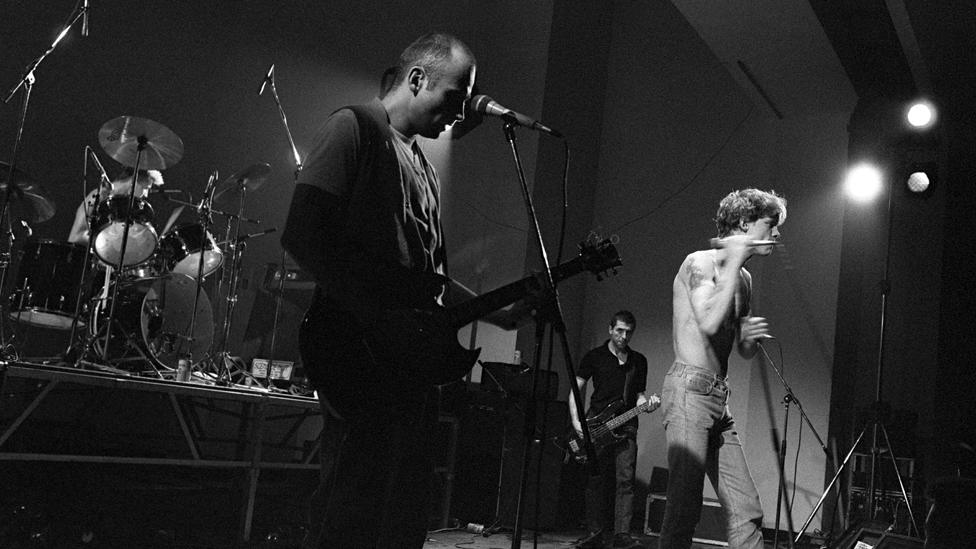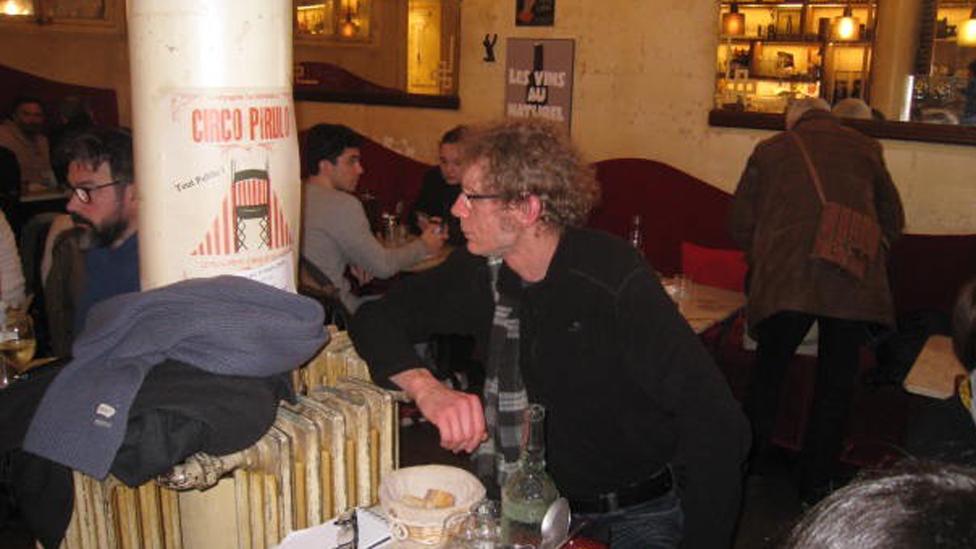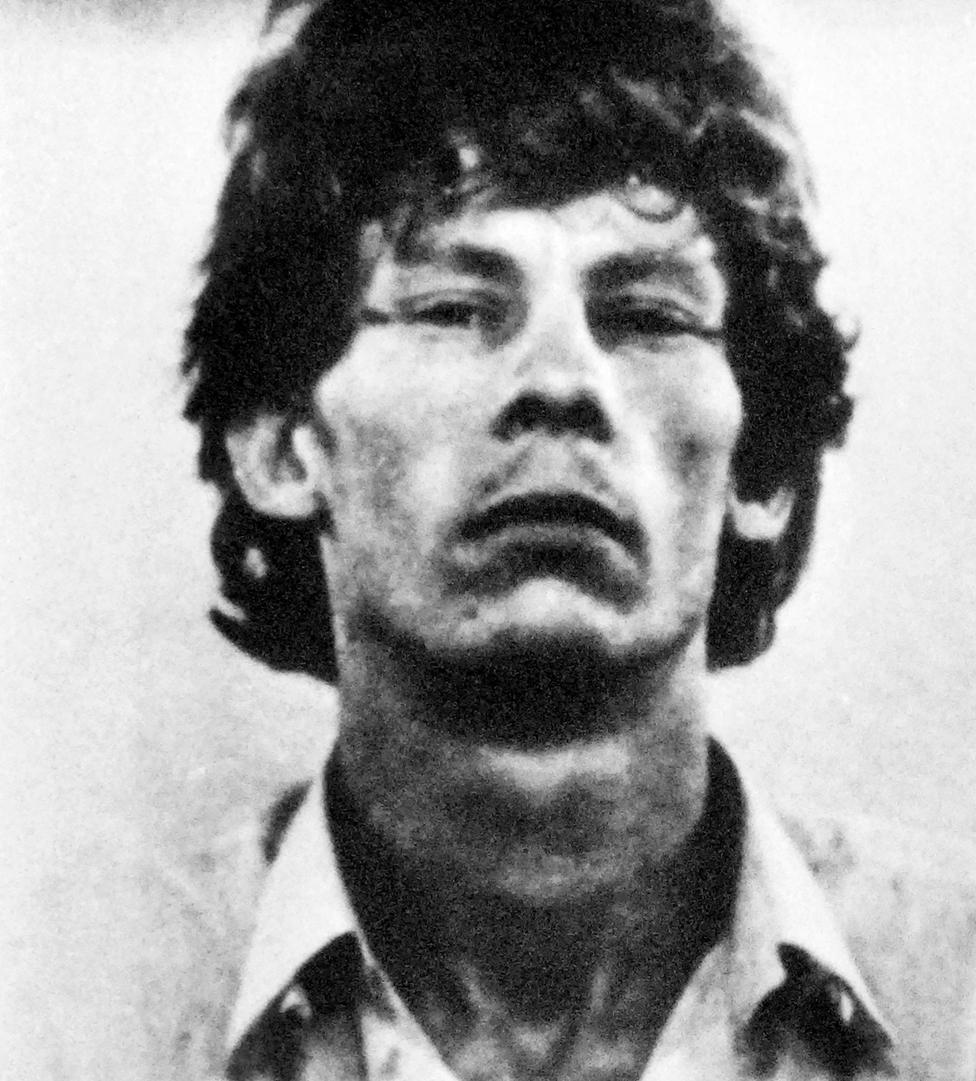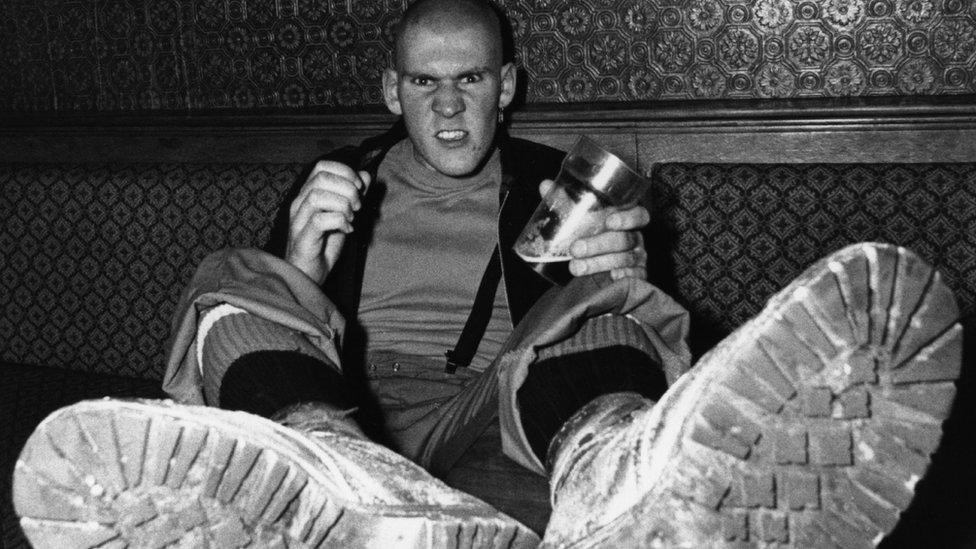The punk who returned from the dead - and handed himself in
- Published

The punk band Camera Silens on stage in 1984
A trial begins on Wednesday 6 June in the southern French city of Toulouse involving a bank heist, the punk music movement that swept Europe in the early 1980s and a man who came back from the dead. Chris Bockman reports on an unlikely comeback.
One of France's most well-known criminal lawyers, Christian Etelin, was sitting at his desk late at night last November contemplating retirement, when he received a phone call that stunned him. First of all, because the caller had been declared dead years ago - and secondly, because it involved a brash armed robbery that occurred nearly 30 years ago.
The voice on the other end of the phone was that of Gilles Bertin - a one-time nihilist punk singer with a Bordeaux Group called Camera Silens with a heavy following amongst anarchists and extreme left-wing youths who thought there was no future, for them at least. Britain had Sid Vicious and the Sex Pistols - Gilles Bertin was France's equivalent.

Christian Etelin is a high-profile criminal lawyer
In the late 1980s the group and their hangers-on were destitute, despite their success, and addicted to drugs. Several had been infected with the HIV virus after sharing contaminated heroin syringes.
They figured they didn't have long to live, so they decided to go out with a bang, mount a massive armed robbery and then blow it all before they died.
And that's exactly what some of the band members did - they stole 12 million francs (nearly 2 million euros) from a Brinks deposit in Toulouse - a small fortune at the time. They even - apparently - called the local newspaper afterwards boasting of their feat. No-one was injured in the robbery and the police quickly realised they were dealing with amateurs. All were caught within a year except one suspect, Gilles Bertin.
Hardly any of the money was retrieved and some of the anarchist robbers, already very sick, died from AIDS-related symptoms.
The others, after spending a brief time in jail, returned to obscurity and nine-to-five jobs.

Gilles Bertin on stage in 1984 at the Chaos Festival in Orléans
Gilles Bertin received a 10-year sentence in his absence and as the years passed, the robbery and punk movement faded from view. The singer/convicted armed robber was declared dead. His family - including his son born during those wild years in Bordeaux - had never heard from him again.
And yet he is very much alive when I meet him at a crowded ancient brasserie called the Cafe de la Concorde for lunch in the heart of Toulouse. Tall with shaggy hair and blind in one eye - a consequence of hepatitis caused by drug use - he is incredibly polite and shy. He tells me a little about those 28 years on the run and why he has returned.

Gilles Bertin in a cafe in Toulouse - he is reluctant to pose for the cameras
After the robbery, he was literally carrying bags of banknotes and he headed to Portugal, where he opened a record store - all paid for in cash, of course. Occasionally a travelling French music fan would recognise him but he would deny it was him. Every time he saw a car with French number plates outside the store he was convinced he was being monitored or followed.
After 10 years of running the shop he thought the French police were really on his tracks this time and he headed to Barcelona with his Spanish girlfriend. Her family ran a bar and he became the barman. They had a child. Only his girlfriend knew about his background - to everyone else he was a man with no past.

Find out more
From Our Own Correspondent has insight and analysis from BBC journalists, correspondents and writers from around the world
Listen on iPlayer, get the podcast or listen on the BBC World Service, or on Radio 4 on Thursdays at 11:00 and Saturdays at 11:30 BST

But he told me that when he was close to death with hepatitis and was saved by hospital staff in Barcelona free of charge, no questions asked, because he had no documents, it was the turning point - time to confront his past and be honest with his son. His life had been saved, while he had provided nothing for society.
"I realised I had to tell the truth and come clean about my past," he says.
Hence that phone call to the lawyer. He crossed the border by train to Toulouse and, with his lawyer, turned himself in at police headquarters.
While he admits he is nervous with the court date looming, he nevertheless feels a burden has been lifted.
"This is the final stage of a long ordeal that I have to go through," he says. "However, I am anxious, it gives me vertigo thinking about it especially as I know I risk a 20-year prison sentence.
"But I am really doing this for my seven-year-old son. He still doesn't really understand what I did during my nearly 30 years on the run - but he needs to know."
Expecting to be jailed immediately, to his complete surprise he found he could remain free until his trial - where he will plead guilty. He says the decision not to imprison him has made him even more angry with himself for what he did.

Gilles Bertin in a 1988 police mugshot
But if some people think his past is romantic he wants to make it clear he would never want to have the life he had again.
"There was nothing romantic about what I did," he says. "In hiding, unable to talk about yourself or to people from your past, including my son, constantly on the look-out in case the authorities find you - and on top of that I was seriously ill."
For three decades, he says, he lived a lie, with shame. He constantly felt like a hunted animal, living in permanent paranoia. As he awaits trial he's writing about his experience on the run and has even reunited with his other son, now 30 years old.
He hopes he can convince the judge that he has changed.
"Back in the late 70s and early 80s I was an angry young man, a nihilist, an anarchist on a destructive path and in revolt against society. You have to understand the context back then," he says.
"I made mistakes but I am not that same person now - at 57 I am more mature and have nothing to do with that period in my life."
Since his return from the dead, Bertin has re-established contact with some of the ex-band members (and Brinks robbery associates) who are still alive - many aren't. One now drives a bus, another is an orderly on a hospital ward. Does he still listen to his old music?
He winces and says his music back then was appalling - these days he listens to soul. If he avoids a jail sentence he will return to Barcelona, but no longer live undercover.
"Hopefully I will be able to explain to my son the choices that I made back then."
He admits he finds the media interest in his life "a little overwhelming".
When it comes to the Brinks money, he insists he spent it all a very long time ago.
As for his 74-year-old lawyer Christian Etelin, who has defended convicted far-left terrorists, Islamic fanatics and gangsters all his life - he decided to put off retirement. This was a case he just couldn't let go.

More from the BBC

He was a skinhead and the poster boy for one of the 1980s' most notorious far-right movements. But Nicky Crane was secretly gay. Then his precarious dual existence fell dramatically apart.
The secret double life of a gay neo-Nazi (December 2013)
Join the conversation - find us on Facebook, external, Instagram, external, YouTube, external and Twitter, external.
